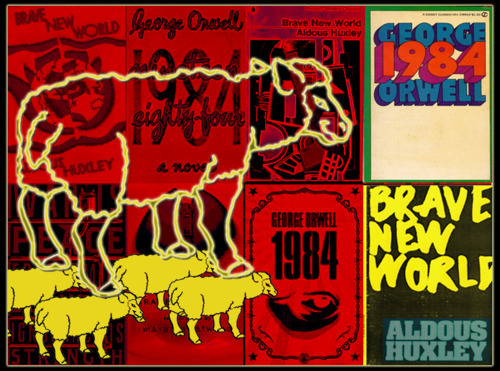Who, we sometimes ask, at the dinners and debates of the intelligentsia, was the 20th century’s more insightful prophet — Aldous Huxley or George Orwell? Each is best known for his dystopian fantasy — Huxley’s Brave New World, Orwell’s 1984 — and both feared where modern technology might lead, for authorities and individuals alike. But while Huxley anticipated a world of empty pleasures and excessive convenience, Orwell predicted ubiquitous surveillance and the eradication of freedom. Who was right? —William Davies, New Statesman, August 1, 2005

Image: Lisa Jane Persky
By Jeffrey Wasserstrom
The long-standing Huxley vs. Orwell debate got a 21st century New Media makeover in 2009, courtesy of cartoonist Stuart McMillen. In May of that year, he published an online comic entitled “Amusing Ourselves to Death” that quickly went viral. At the top of this strip, which has been tweeted and re-tweeted many times and can now be found posted on scores of websites, we see caricatures of the two authors above their names and the respective titles of their best-known novels. Below that comes a series of couplet-like contrastive statements, accompanied by illustrations. The top couplet reads: “What Orwell feared were those who would ban books; What Huxley feared was that there would be no need to ban a book, for there would be no one who would want to read one.” The first statement is paired with a picture of a censorship committee behind a desk, with a one-man “Internet Filter Department” off to one side, a wastebasket for banned books off to the other. The illustration for the second statement shows a family of couch potatoes waiting for The Biggest Loser to return after a word from its sponsors.
McMillen’s “Amusing Ourselves to Death” might best be called an homage, or perhaps a reboot, for the lines in it all come straight from media theorist Neil Postman’s influential 1985 book of the same title, which made the case for Huxley’s famous 1932 novel being a superior guide to the era of television than Orwell’s from 1949. But Postman himself was far from the first to play the Huxley vs. Orwell game. The tradition of comparing and contrasting Huxley and Orwell goes back to, well, Huxley and Orwell, two writers who — though this is not mentioned as often as one might expect — knew one another from Eton, where Orwell was Huxley’s pupil in the 1910s.
Orwell had not yet written 1984 when he first questioned his former teacher’s prescience. In the early 1940s, a reader of his newspaper column solicited Orwell’s opinion of the danger that consumerism and the pursuit of pleasure posed to society. Orwell replied that, in his view, the time to worry about Brave New World scenarios had passed, for hedonism and “vulgar materialism” were no longer the great threat they once had been.
In October 1949, just a few months after Orwell published 1984 (a work that presumably spelled out the more pressing threats he had in mind), Huxley wrote to his former pupil to make the opposite point. Orwell’s book impressed him, he said, but he did not find it completely convincing, because he continued to think, as he had when crafting Brave New Word, that the elites of the future would find “less arduous” strategies for satisfying their “lust for power” than the “boot-on-the-face” technique described in 1984.
Huxley wrote that letter in Britain during a month that began with a momentous event taking place a


